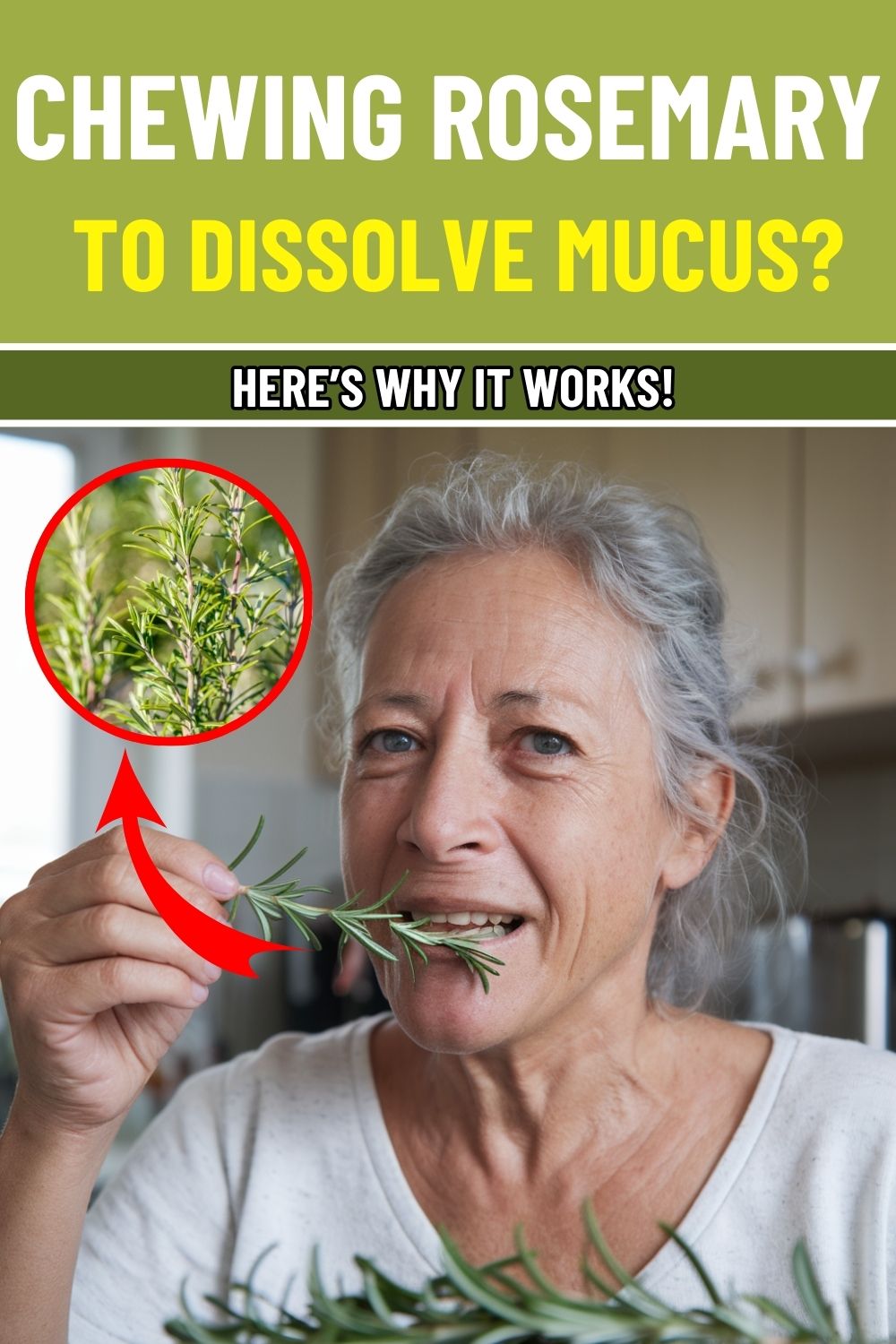Rosemary (Rosmarinus officinalis) is a powerful natural decongestant with expectorant and anti-inflammatory properties.
Packed with rosmarinic acid, cineole (eucalyptol), and antioxidants, rosemary helps to break down mucus, soothe airways, and promote lung health.
Studies suggest chewing rosemary can loosen phlegm, clear nasal passages, and even help fight respiratory infections.
#1. Acts as a Natural Expectorant to Dissolve Mucus
Mucus buildup in the airways can make breathing difficult and lead to persistent coughing. Rosemary contains cineole (eucalyptol), a well-known expectorant that helps break down thick mucus and expel it from the lungs.
A study published in Pulmonary Pharmacology & Therapeutics found that cineole helps loosen and clear phlegm, making it easier to cough up.
By chewing rosemary, you stimulate the release of cineole directly into your respiratory system, leading to faster mucus breakdown and easier breathing.

#2. Opens Up Congested Airways and Eases Breathing
Rosemary is a natural bronchodilator, meaning it helps relax airway muscles and widen the bronchial passages. This is particularly helpful for those with asthma, chronic bronchitis, or seasonal allergies.
Research from Evidence-Based Complementary and Alternative Medicine suggests that the active compounds in rosemary improve oxygen flow and reduce airway inflammation.
If you often feel tightness in your chest or shortness of breath, chewing rosemary may provide quick relief.
#3. Reduces Inflammation in the Respiratory Tract
Chronic inflammation in the airways can trigger excessive mucus production and worsen conditions like asthma or COPD. Rosemary is loaded with rosmarinic acid and flavonoids, which have strong anti-inflammatory effects.
A study in The Journal of Inflammation found that rosmarinic acid suppresses inflammation in lung tissues, reducing swelling and improving airflow.
Regular use of rosemary may help prevent mucus buildup over time and promote long-term respiratory health.

#4. Fights Bacteria and Viruses That Cause Respiratory Infections
If mucus buildup is due to an infection, rosemary can help. It has antimicrobial and antiviral properties that target common respiratory pathogens like Staphylococcus aureus and Influenza A.
A study in Phytotherapy Research found that rosemary extract inhibits bacterial growth and strengthens immune response, making it a natural remedy for colds, flu, and sinus infections.
By chewing fresh rosemary daily, you may reduce the severity of infections and speed up recovery.
#5. Supports Lung Detoxification
Your lungs naturally detoxify themselves by removing mucus, toxins, and pollutants. However, exposure to smoke, pollution, and allergens can overload your respiratory system.
Rosemary enhances liver function and blood circulation, helping your body clear toxins more efficiently. Studies suggest that rosemary’s polyphenols support lung detoxification, helping expel irritants and reduce respiratory discomfort.

How to Use Rosemary to Dissolve Mucus
1. Chewing Fresh Rosemary Leaves
First, pluck a few fresh rosemary leaves and rinse them. Then, chew them slowly, allowing the essential oils to coat your throat and enter your respiratory system.
You may experience a slightly bitter taste, but this is a sign of its powerful compounds working! Chew for about 5 minutes, then swallow or spit out the residue. Repeat twice daily for best results.
2. Rosemary and Honey Cough Remedy
First, crush 1 teaspoon of fresh rosemary leaves. Then, mix with 1 teaspoon of raw honey.
Swallow this mixture once in the morning and once before bed. Honey acts as a soothing agent, making this ideal for dry coughs and throat irritation.
3. Rosemary Steam Inhalation for Mucus Relief
Boil 2 cups of water and add a handful of rosemary sprigs. Let it steep for 5 minutes, then cover your head with a towel.
Inhale the steam deeply for 5–10 minutes to clear nasal and bronchial congestion. Do this once daily, especially before sleep, for better breathing.

Cautions and Precautions
Pregnant women should consult a doctor before chewing rosemary, as high doses may stimulate contractions.
People on blood thinners should avoid excessive consumption, as rosemary may have mild anticoagulant effects.
Those with acid reflux may experience mild irritation, so start with small amounts.
If you experience allergic reactions, nausea, or dizziness, discontinue use and consult a healthcare professional.
Disclaimer
This article is for informational purposes only and should not replace medical advice. If you have pre-existing respiratory conditions or are on medication, consult a doctor before using rosemary for mucus relief.

Chewing Rosemary to Dissolve Mucus? Here’s Why It Works!
